27 Ways To Save Money On Groceries In 2025
These are some must know ways to help you save money on groceries. Are you tired of overspending on groceries and looking for practical ways to cut down your food expenses?
Look no further than this helpful list of the best tips to help you save money on groceries.
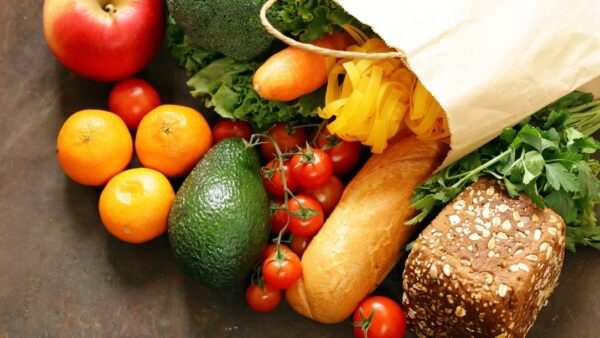
From meal planning to shopping techniques, here’s some valuable advice that can lead to significant savings on your next trip to the grocery store.
How To Save Money On Groceries
1. Create a Meal Plan
Crafting a weekly meal plan will help save money on your groceries.
By planning your meals in advance, you will buy only what you need, eliminating the costly habit of impulsive purchases from fast food or going out every day for lunch.

A meal plan allows you to take advantage of bulk discounts and reduces food waste, as you can create multiple meals using similar ingredients.
We have a ton of make ahead overnight oats recipes to help you stay away from fast food right here on our blog. Start with our easy make ahead breakfast ideas.
2. Use a Shopping List
A shopping list is your best friend when it comes to grocery shopping. By jotting down the items you need before heading to the store, you’re less likely to be swayed by tempting promotions or items you don’t actually require.
If you use Google Sheets, this spreadsheet by Serenatas Essentials is amazing for keeping your lists organized.
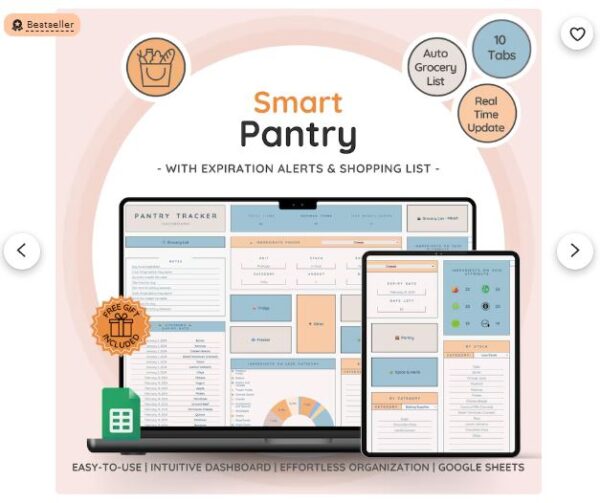
Stick to your list, and you’ll see a noticeable reduction in your grocery bill.
3. Buy Generic Brands
Generic or store brands often offer equivalent quality to name brands but at a lower cost. You can save a substantial amount over time by substituting some of your regular purchases with generic alternatives.

4. Shop Seasonally
Buying fruits and vegetables in season not only guarantees freshness but also typically results in lower prices. Seasonal produce is abundant and doesn’t require long-distance shipping, making it a cost-effective choice.
5. Clip Coupons
Coupons are an age-old strategy for cutting costs on groceries. You can find them in newspapers, online, and through store apps. By using coupons strategically, you can save money on a variety of items.
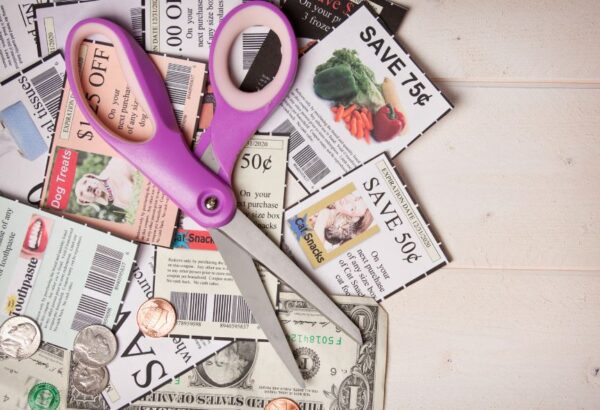
6. Join a Rewards Program
Many grocery stores offer loyalty programs that reward you with discounts, cashback, or exclusive offers. Take advantage of these programs to maximize your savings every time you shop.
One time I went to a store that I don’t normally shop at and I saw that they have a fantastic rewards program, so it’s really good to check your normal store and also new ones to try.
7. Buy In Bulk And Preserve
For non-perishable items like rice, pasta, canned goods, and cleaning supplies, buying in bulk can significantly lower your per-unit costs. Just be sure to store them properly so they last as long as possible.
Freeze drying is getting really popular right now. The machines are quite expensive but what many people are doing is buying them and then offsetting the cost by making freeze dried packages and selling them at craft show and bake sales.
Here’s an article about how to freeze dry and also a list of foods that can be freeze dried.

I have a friend that does this and when I went to her house she had a ton of stuff ready to go for her next show. She’s starting to make some really good money with her freeze dryer.
Some of her top sellers are freeze dried vegetables and full meals like lasagna.

8. Use Cashback Apps
Download cashback apps like Honey to earn cash back on your grocery purchases. These apps often provide additional savings and rewards beyond what you’d get with traditional coupons.
9. Compare Prices
Pay attention to unit prices on the shelf labels to determine which product offers the best value. Sometimes, buying a larger size may be more cost-effective in the long run.
I like to use my phone calculator to do actual number because sometimes buying the larger thing can be more expensive than buying two smaller things, so really know the numbers.
10. Avoid Pre-Packaged Foods
Pre-cut or pre-packaged fruits, vegetables, and other items are convenient but often come with a premium price.
Getting whole produce and preparing them at home is more budget-friendly and also allows for customization. Buy fresh without the bag or plastic containers and save money.

If you want to start making your own snacks and treats for lunches, here’s some tips for making the best cookies to help get you started.
11. Limit Impulse Purchases
One of the biggest budget busters is succumbing to impulsive buys while shopping. Stick to your shopping list and resist the urge to add unplanned items to your cart. Having a meal prep spreadsheet really helps with this.
12. Utilize Leftovers
Plan your meals in a way that allows you to repurpose leftovers into new dishes. This not only saves money but also reduces food waste.
For instance, leftover vegetables can be incorporated into soups or stews, and unused pasta can be combined with fresh ingredients to make a pasta salad.

last night’s roasted chicken can become today’s chicken salad sandwich, or extra rice can be transformed into a delicious fried rice dish with added vegetables and seasonings.
You can also use up leftover banana bread by making banana bread overnight oats. This is really yummy and helps cut down on food waste.

13. Shop Online
Online grocery shopping has gained popularity for its convenience and the ability to avoid in-store temptations. Compare prices, use digital coupons, and take advantage of special online-only deals to maximize your savings.
For example Amazon has a full selection of grocery items that you can often get for cheaper than the grocery store.
14. Try Frozen Produce
Frozen fruits and vegetables can be just as nutritious as their fresh counterparts and are often more affordable. Plus, they have a longer shelf life, reducing the risk of spoilage. The frozen food section might have some really great deals on.
15. Invest in a Deep Freezer
If you have the space, consider getting a deep freezer. This allows you to purchase items in bulk when they’re on sale, preserving their quality and saving you money over time.
I have my regular fridge freezer upstairs and then in the basement I have a stand up freezer for meal prepping.
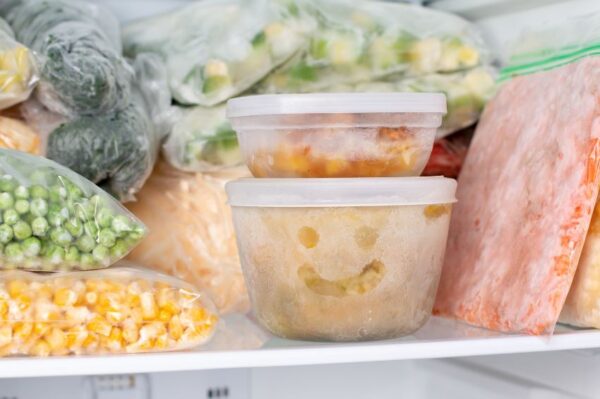
16. Use Your Freezer Properly
Maximize your freezer space by storing leftovers, bulk purchases, and homemade soups, sauces, and casseroles. Properly labeled and stored, these items can save you time and money when you need a quick and easy meal.
Another tip is to put food into the freeze that is cold, so put it in the fridge overnight fist before putting it into the freezer.
17. Go Meatless
Incorporating more meatless meals into your diet can be both cost-effective and healthy. Plant-based protein sources like beans & lentils are typically less expensive than meat.

18. Price Match
Some stores offer price-matching policies, allowing you to get the best deal without visiting multiple locations. Check with your local store to see if they offer this money-saving option.
19. Cook in Batches
Preparing meals in larger quantities and freezing portions can save you time and money. You’ll have homemade food readily available and avoid the need for takeout or restaurant meals on busy days.
Meals like our baked blueberry oatmeal is fantastic for making in batches and freezing for later.

Another recipe to make ahead in batches is our best soft and chewy oatmeal cookies. You can make a whole bunch and freeze them for lunches.
20. Buy Whole Grains
Whole grains like brown rice, whole wheat pasta, and oats are not only healthier but often more affordable than their refined counterparts. They’re also more filling, meaning you’ll eat less and save money in the long run.
21. Limit Dining Out
Reducing the frequency of restaurant visits and takeout orders can free up a significant portion of your budget for groceries.

Eating at home is not only more cost-effective but also allows you to have more control over the ingredients you use.
22. Shop Early or Late
Timing can be everything when it comes to saving money on groceries. Some stores mark down items that are nearing their sell-by date early in the morning or late in the evening.
Be on the lookout for these discounts, but ensure the products are still safe and fresh for consumption.
23. Learn to Preserve
Canning, pickling, and preserving are valuable skills that can extend the shelf life of seasonal produce. Here’s our list of the best food dehydrators for this year.
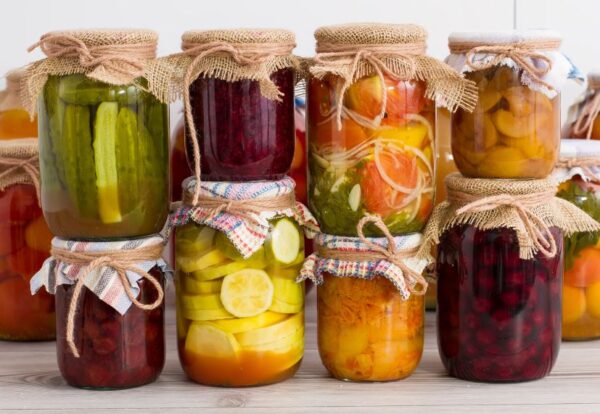
By taking advantage of these techniques, you can enjoy your favorite fruits and vegetables year-round and save money in the process.
24. Plant A Garden
Planting a garden is a rewarding and fulfilling outdoor activity that allows you to grow your own fresh produce, flowers, or herbs right at home.
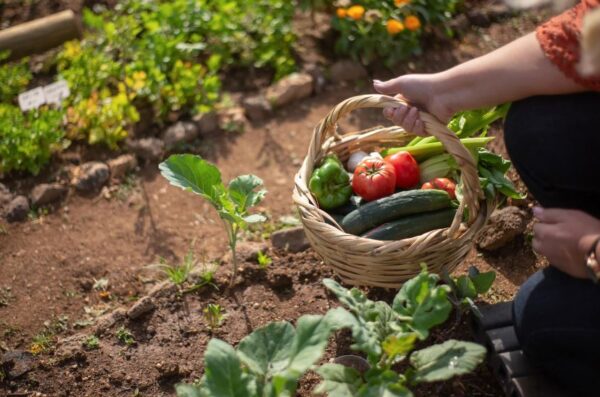
Not everyone can plant a garden, so if your community offers access to a communal garden, take advantage of it.
Community gardens give you an opportunity to grow your own fresh produce at a fraction of the cost of store-bought items. And if you have a balcony, you can always use grow bags for tomatoes, cucumbers and lettuce.
25. Eliminate Beverages
Drinking tap water instead of purchasing bottled water, soda, or other beverages can result in significant savings. You’ll also reduce plastic waste and promote a healthier hydration habit. Did you know you can make your own milk which can also help save money? All you need is a bag of old fashioned rolled oats and water for a dairy free milk you can whip up anytime.

26. Reduce Food Waste
One of the most effective ways to save money on groceries is by reducing food waste. Be mindful of expiration dates, use leftovers creatively, and incorporate “use-it-up” meals that help you make the most of the ingredients you already have.
This not only stretches your budget but also contributes to a more sustainable and eco-friendly approach to food consumption.
27. Have A Meal Planner Book
Having a meal planner is an essential tool for managing your finances effectively. It allows you to track your groceries, set financial goals, and allocate funds to various categories, including breakfast, lunches and more.
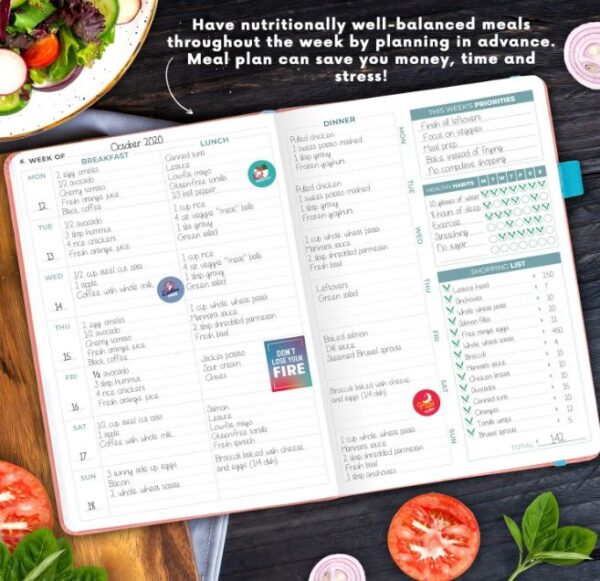
Saving Money On Groceries For Families FAQ’s
How can I reduce my grocery bill without sacrificing the quality of the food my family eats?
You can save money on groceries without compromising quality by buying generic brands, shopping seasonally, using coupons, and taking advantage of store loyalty programs.
Cooking meals from scratch, planning your meals, and minimizing convenience foods can help you maintain food quality while cutting costs.

Making your own bread can be a huge savings if you are constantly spending money on loaves of bread at the store. This can be turned into a fun way to spend some time with the kids and unplug for a while.
Here’s a fantastic homemade bread recipe from DIY Craft Club.
Is it worth investing in a deep freezer for a family to save money on groceries?
Getting a deep freezer can be a wise decision for families. It allows you to buy in bulk, take advantage of sales, and store prepared meals.
This can save you both time and money in the long run. It also helps prevent food waste by preserving items for extended periods.

How can I get my children involved in saving money on groceries and making wise food choices?
Getting kids involved in grocery shopping can be a great learning experience. You can teach them about budgeting, healthy food choices, and the importance of meal planning.
Allow them to help create shopping lists, compare prices, and choose fruits and vegetables. This involvement not only educates them but also makes them more conscious consumers.
What are some strategies for families to minimize food waste and save money on groceries?
To reduce food waste, plan your meals, use leftovers creatively, and implement “use-it-up” meals that incorporate ingredients you already have.
Proper storage of food, such as using airtight containers and understanding expiration dates, can also help prevent waste.

Composting can be an eco-friendly solution for items that can’t be consumed. Also, dehydrating food is another storage option if you are constantly throwing out fruit & vegetables.
You can turn these into healthy snacks like making your own banana chips as shown by SugarField DIY in the video below.
How can I make the most of my family’s food budget when dealing with dietary restrictions or food allergies?
Managing dietary restrictions or food allergies may seem challenging, but it’s possible to save money. Start by focusing on whole, naturally allergen-free foods like rice, beans, fruits, and vegetables.
Buying in bulk, cooking from scratch, and seeking out specialty stores with competitive prices on allergy-friendly products can also help you stay within your budget while catering to your family’s unique dietary needs.
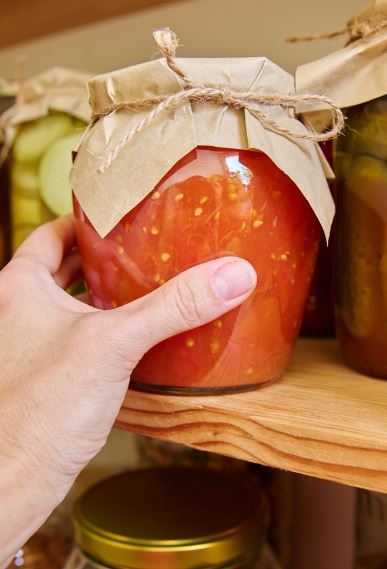

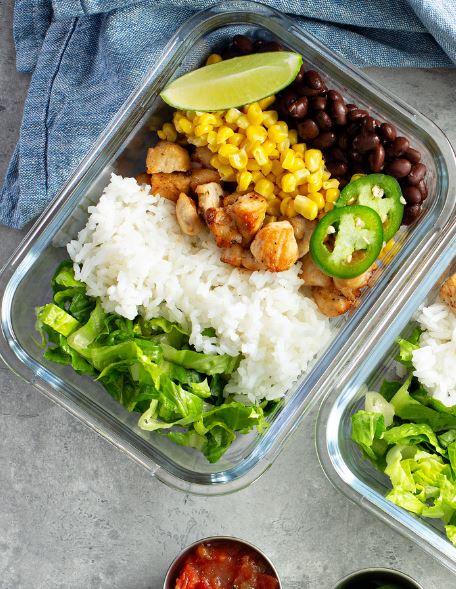

Saving Money On Groceries For Singles FAQ’s
How can I save money on groceries when cooking for one without creating food waste?
To avoid food waste, consider buying smaller quantities, using frozen and canned produce, and planning meals that can be repurposed or frozen for later use. Meal prepping in smaller batches and shopping more frequently for fresh ingredients can also help reduce waste.
What are some cost-effective ways to buy in bulk as a single person?
Look for bulk bins at grocery stores where you can purchase the quantity you need. Consider sharing bulk purchases with friends or family, or opt for club memberships where you can buy non-perishable items in bulk and split them into manageable portions.
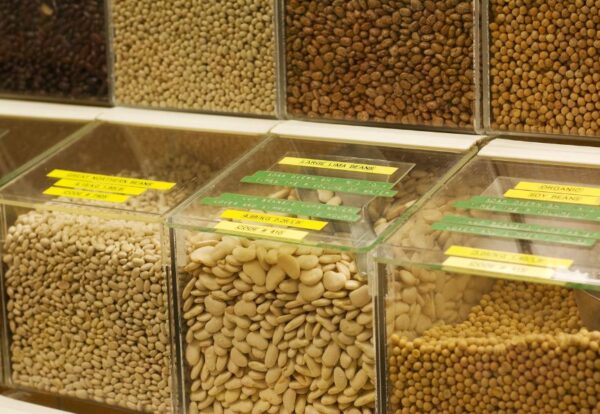
Are there specific tips for single individuals to navigate sales and discounts effectively?
Singles can benefit from sales and discounts by keeping an eye on smaller-sized items or sales that offer a variety of products. Consider investing in a loyalty program or cashback apps to maximize savings on your grocery purchases.
How can I save money on groceries as a single person when it comes to meal planning and cooking for one?
Adapt meal planning to your needs by preparing single-serving portions, repurposing leftovers, or cooking larger batches and freezing individual servings. You can also explore recipes that can be easily scaled down to avoid food waste.
What strategies can I use to make grocery shopping as a single person more efficient and budget-friendly?
Save time and money by shopping with a list, avoiding impulsive purchases, and choosing more affordable options such as store brands or generic products.
Opt for grocery delivery or curbside pickup to minimize in-store temptations and shop for groceries during off-peak hours to avoid crowds and save time.

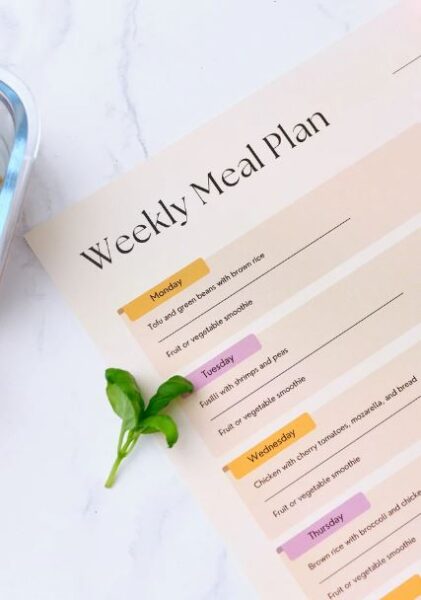
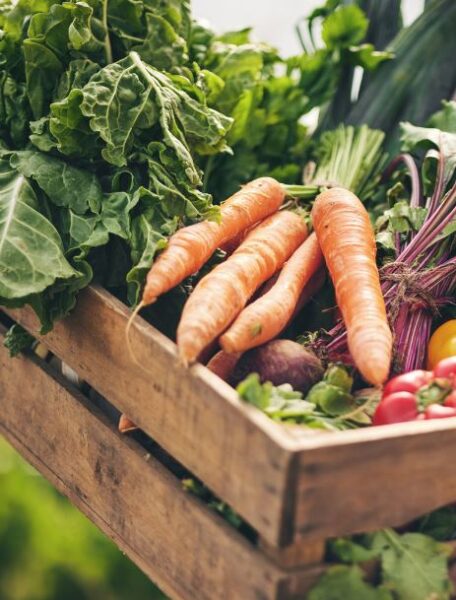
Saving Money On Groceries For Students FAQ’s
As a student on a tight budget, how can I save money on groceries without sacrificing nutrition and health?
You can save money while maintaining a healthy diet by buying staple foods like rice, beans, oats, and frozen vegetables. Look for discounts, sales, and student discounts at local grocery stores, and consider meal prepping to reduce the need for expensive takeout or dining out.
If you love to prep meals ahead of time the night before, check out our recipes for easy meals that you can grab and go. One of our most popular overnight oats recipe for students is our Cocoa Overnight Oats recipe.

What are some tips for students living in dorms or shared accommodations to save on groceries?
For students living in dorms or shared spaces, consider sharing the cost of common ingredients with roommates. You can also invest in a mini-fridge or a microwave for basic meal preparation and storage, and choose non-perishable items like canned goods and instant noodles.
How can I make the most of my meal plan or cafeteria options to save money on food while living on campus?
Utilize your meal plan or cafeteria options efficiently by taking advantage of all available meals and making the most of dining hall offerings. Be conscious of portion sizes and avoid purchasing additional food outside the meal plan unless necessary.

Are there any student-specific discounts, apps, or programs that can help me save on groceries?
Many grocery stores offer student discounts, and various cashback apps and loyalty programs can provide savings. Check for local discounts and student-specific offers in your area, and consider joining a food co-op or community-supported agriculture (CSA) for affordable fresh produce.
What strategies can I use to minimize food waste and save money on groceries as a student?
To reduce food waste, plan your meals, store leftovers in airtight containers, and learn how to properly freeze items. You can also create “use-it-up” meals to make the most of ingredients you already have, saving both money and reducing waste. Also, opt for easy snacks that are healthy, and do not go bad right away like nuts.
We have a helpful guide on some nut ideas for grab and go snack and dried fruits for snacking on.

Thanks for taking the time to read up on these money-saving strategies for your grocery shopping.
By using these tips, you can make a significant impact on your budget, reduce food waste, and enjoy the satisfaction of smarter, more cost-effective shopping.
Happy saving, and may your meals be not only delicious but also budget-friendly!
More articles to explore






